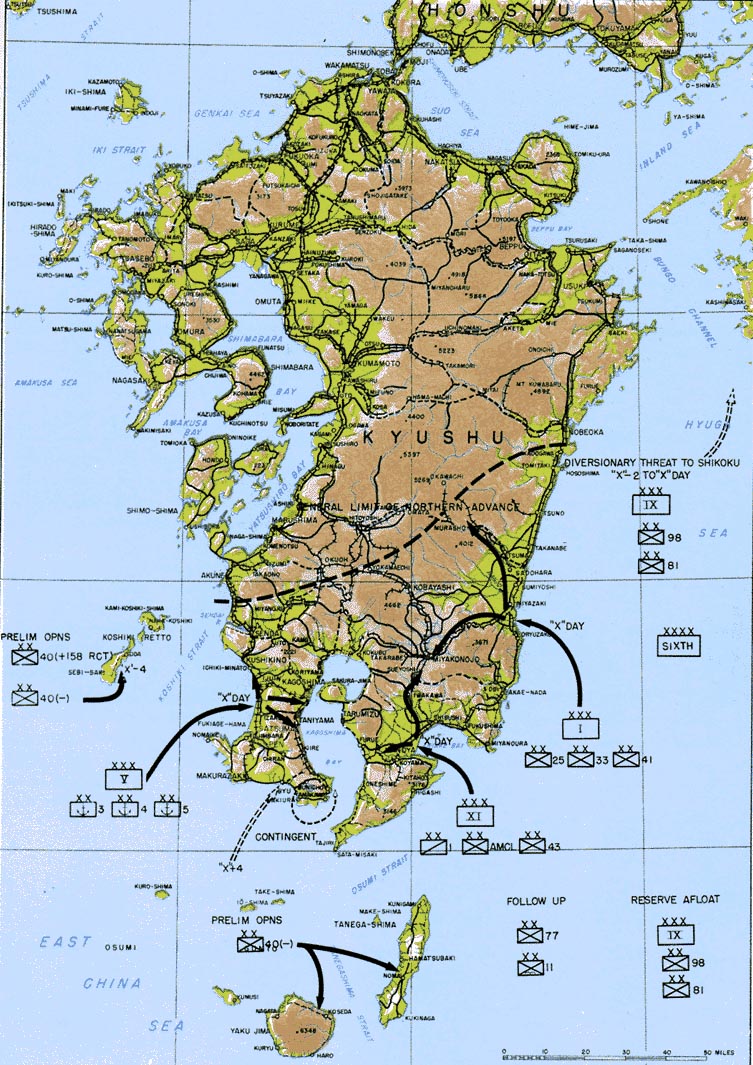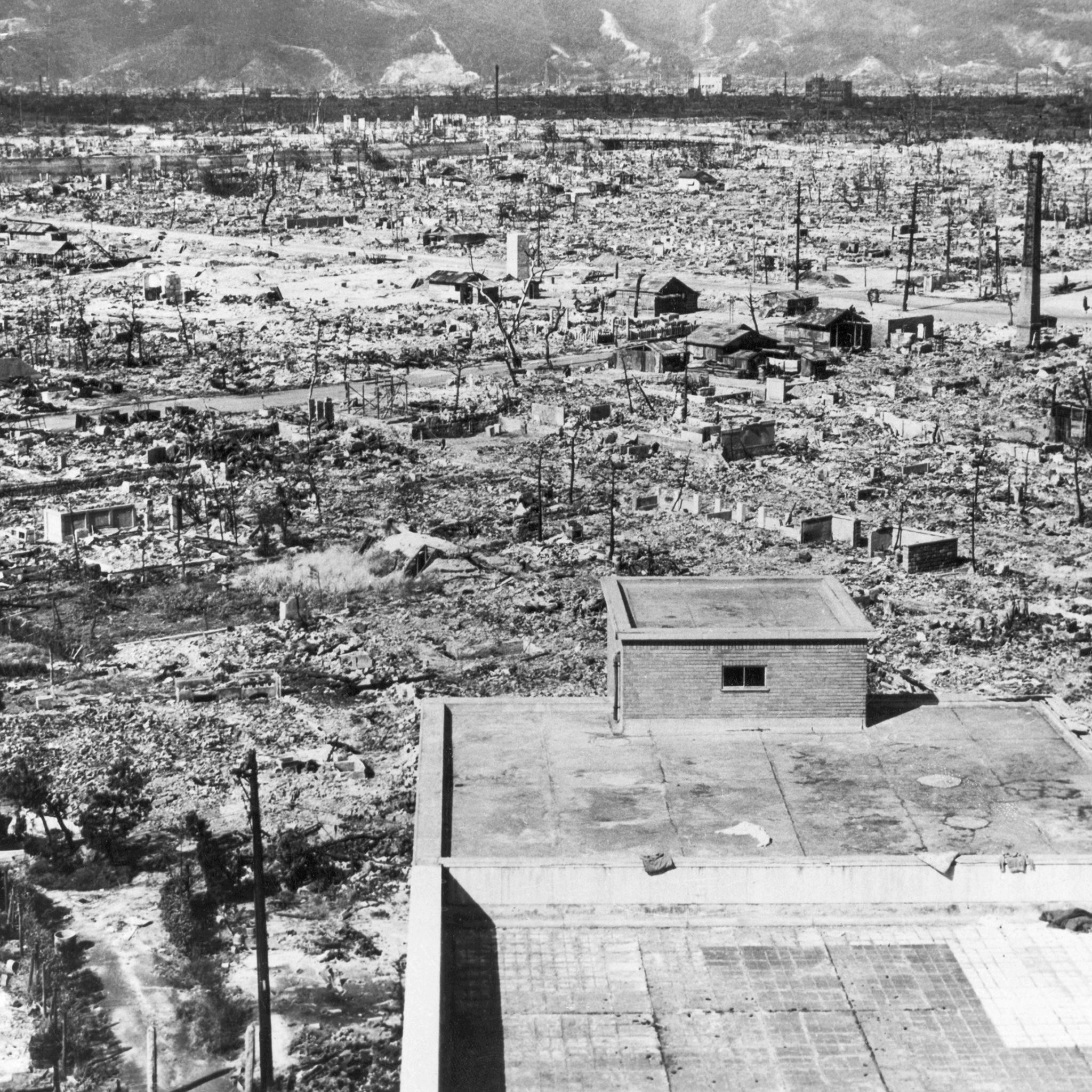|
Atomic Bombings Of Hiroshima And Nagasaki
The United States detonated two atomic bombs over the Japanese cities of Hiroshima and Nagasaki on 6 and 9 August 1945, respectively. The two bombings killed between 129,000 and 226,000 people, most of whom were civilians, and remain the only use of nuclear weapons in armed conflict so far. In the final year of World War II, the Allies prepared for a costly invasion of the Japanese mainland. This undertaking was preceded by a conventional and firebombing campaign that devastated 64 Japanese cities. The war in the European theatre concluded when Germany surrendered on 8 May 1945, and the Allies turned their full attention to the Pacific War. By July 1945, the Allies' Manhattan Project had produced two types of atomic bombs: "Fat Man", a plutonium implosion-type nuclear weapon; and "Little Boy", an enriched uranium gun-type fission weapon. The 509th Composite Group of the United States Army Air Forces was trained and equipped with the specialized Silverplate version of the ... [...More Info...] [...Related Items...] OR: [Wikipedia] [Google] [Baidu] |
Pacific War
The Pacific War, sometimes called the Asia–Pacific War, was the theater of World War II that was fought in Asia, the Pacific Ocean, the Indian Ocean, and Oceania. It was geographically the largest theater of the war, including the vast Pacific Ocean theater, the South West Pacific theater, the Second Sino-Japanese War, and the Soviet–Japanese War. The Second Sino-Japanese War between the Empire of Japan and the Republic of China had been in progress since 7 July 1937, with hostilities dating back as far as 19 September 1931 with the Japanese invasion of Manchuria. However, it is more widely accepted that the Pacific War itself began on 7 December (8 December Japanese time) 1941, when the Japanese simultaneously invaded Thailand, attacked the British colonies of Malaya, Singapore, and Hong Kong as well as the United States military and naval bases in Hawaii, Wake Island, Guam, and the Philippines. The Pacific War saw the Allies pitted against Japan, the latter ai ... [...More Info...] [...Related Items...] OR: [Wikipedia] [Google] [Baidu] |
Operation Downfall
Operation Downfall was the proposed Allied plan for the invasion of the Japanese home islands near the end of World War II. The planned operation was canceled when Japan surrendered following the atomic bombings of Hiroshima and Nagasaki, the Soviet declaration of war, and the invasion of Manchuria. The operation had two parts: Operation Olympic and Operation Coronet. Set to begin in November 1945, Operation Olympic was intended to capture the southern third of the southernmost main Japanese island, Kyūshū, with the recently captured island of Okinawa to be used as a staging area. In early 1946 would come Operation Coronet, the planned invasion of the Kantō Plain, near Tokyo, on the main Japanese island of Honshu. Airbases on Kyūshū captured in Operation Olympic would allow land-based air support for Operation Coronet. If Downfall had taken place, it would have been the largest amphibious operation in history, surpassing D-Day. Japan's geography made this invasion pl ... [...More Info...] [...Related Items...] OR: [Wikipedia] [Google] [Baidu] |
Tinian
Tinian ( or ; old Japanese name: 天仁安島, ''Tenian-shima'') is one of the three principal islands of the Commonwealth of the Northern Mariana Islands. Together with uninhabited neighboring Aguiguan, it forms Tinian Municipality, one of the four constituent municipalities of the Northern Marianas. Tinian's largest village is San Jose. History Spanish colonial period Tinian, together with Saipan, was possibly first sighted by Europeans of the Spanish expedition of Ferdinand Magellan, when it made landfall in the southern Marianas on 6 March 1521. It was likely sighted next by Gonzalo Gómez de Espinosa in 1522 on board the Spanish ship ''Trinidad'', in an attempt to reach Panama after the death of Magellan. This would have happened after the sighting of the Maug Islands in between the end of August and end of September. Gonzalo de Vigo deserted in the Maugs from the ''Trinidad'' and in the next four years, living with the Chamorros, visited thirteen main islands in the ... [...More Info...] [...Related Items...] OR: [Wikipedia] [Google] [Baidu] |
Boeing B-29 Superfortress
The Boeing B-29 Superfortress is an American four-engined propeller-driven heavy bomber, designed by Boeing and flown primarily by the United States during World War II and the Korean War. Named in allusion to its predecessor, the B-17 Flying Fortress, the Superfortress was designed for high-altitude strategic bombing, but also excelled in low-altitude night incendiary bombing, and in dropping naval mines to blockade Japan. B-29s dropped the atomic bombs on Hiroshima and Nagasaki, the only aircraft ever to drop nuclear weapons in combat. One of the largest aircraft of World War II, the B-29 was designed with state-of-the-art technology, which included a pressurized cabin, dual-wheeled tricycle landing gear, and an analog computer-controlled fire-control system that allowed one gunner and a fire-control officer to direct four remote machine gun turrets. The $3 billion cost of design and production (equivalent to $ billion today), far exceeding the $1.9 b ... [...More Info...] [...Related Items...] OR: [Wikipedia] [Google] [Baidu] |
Silverplate
Silverplate was the code reference for the United States Army Air Forces' participation in the Manhattan Project during World War II. Originally the name for the aircraft modification project which enabled a B-29 Superfortress bomber to drop an atomic weapon, "Silverplate" eventually came to identify the training and operational aspects of the program as well. The original directive for the project had as its subject line "Silver Plated Project" but continued usage of the term shortened it to "Silverplate". Testing began with scale models at the Naval Proving Ground in Dahlgren, Virginia, in August 1943. Modifications began on a prototype Silverplate B-29 known as the "Pullman" in November 1943, and it was used for bomb flight testing at Muroc Army Air Field in California commencing in March 1944. The testing resulted in further modifications to both the bombs and the aircraft. Seventeen production Silverplate aircraft were ordered in August 1944 to allow the 509th Composite ... [...More Info...] [...Related Items...] OR: [Wikipedia] [Google] [Baidu] |
United States Army Air Forces
The United States Army Air Forces (USAAF or AAF) was the major land-based aerial warfare service component of the United States Army and ''de facto'' aerial warfare service branch of the United States during and immediately after World War II (1941–1945). It was created on 20 June 1941 as successor to the previous United States Army Air Corps and is the direct predecessor of the United States Air Force, today one of the six United States Armed Forces, armed forces of the United States. The AAF was a component of the United States Army, which on 2 March 1942 was divided functionally by executive order into three autonomous forces: the Army Ground Forces, the United States Army Services of Supply (which in 1943 became the Army Service Forces), and the Army Air Forces. Each of these forces had a commanding general who reported directly to the Chief of Staff of the United States Army, Army Chief of Staff. The AAF administered all parts of military aviation formerly distributed am ... [...More Info...] [...Related Items...] OR: [Wikipedia] [Google] [Baidu] |
Gun-type Fission Weapon
Gun-type fission weapons are fission-based nuclear weapons whose design assembles their fissile material into a supercritical mass by the use of the "gun" method: shooting one piece of sub-critical material into another. Although this is sometimes pictured as two sub-critical hemispheres driven together to make a supercritical sphere, typically a hollow projectile is shot onto a spike which fills the hole in its center. Its name is a reference to the fact that it is shooting the material through an artillery barrel as if it were a projectile. Since it is a relatively slow method of assembly, plutonium cannot be used unless it is purely the 239 isotope. Production of impurity-free plutonium is very difficult and is impractical. The required amount of uranium is relatively large, and thus the overall efficiency is relatively low. The main reason for this is the uranium metal does not undergo compression (and resulting density increase) as does the implosion design. Instead, gun ty ... [...More Info...] [...Related Items...] OR: [Wikipedia] [Google] [Baidu] |
Enriched Uranium
Enriched uranium is a type of uranium in which the percent composition of uranium-235 (written 235U) has been increased through the process of isotope separation. Naturally occurring uranium is composed of three major isotopes: uranium-238 (238U with 99.2739–99.2752% natural abundance), uranium-235 (235U, 0.7198–0.7202%), and uranium-234 (234U, 0.0050–0.0059%). 235U is the only nuclide existing in nature (in any appreciable amount) that is fissile with thermal neutrons. Enriched uranium is a critical component for both civil nuclear power generation and military nuclear weapons. The International Atomic Energy Agency attempts to monitor and control enriched uranium supplies and processes in its efforts to ensure nuclear power generation safety and curb nuclear weapons proliferation. There are about 2,000 tonnes of highly enriched uranium in the world, produced mostly for nuclear power, nuclear weapons, naval propulsion, and smaller quantities for research reactors ... [...More Info...] [...Related Items...] OR: [Wikipedia] [Google] [Baidu] |
Little Boy
"Little Boy" was the type of atomic bomb dropped on the Japanese city of Hiroshima on 6 August 1945 during World War II, making it the first nuclear weapon used in warfare. The bomb was dropped by the Boeing B-29 Superfortress ''Enola Gay'' piloted by Colonel Paul W. Tibbets, Jr., commander of the 509th Composite Group of the United States Army Air Forces and Captain Robert A. Lewis. It exploded with an energy of approximately and caused widespread death and destruction throughout the city. The Hiroshima bombing was the second man-made nuclear explosion in history, after the Trinity nuclear test. Little Boy was developed by Lieutenant Commander Francis Birch (geophysicist), Francis Birch's group at the Manhattan Project's Los Alamos Laboratory during World War II, a reworking of their unsuccessful Thin Man (nuclear bomb), Thin Man nuclear bomb. Like Thin Man, it was a gun-type fission weapon, but it derived its explosive power from the nuclear fission of uranium-235, where ... [...More Info...] [...Related Items...] OR: [Wikipedia] [Google] [Baidu] |
Implosion-type Nuclear Weapon
Nuclear weapon designs are physical, chemical, and engineering arrangements that cause the physics package of a nuclear weapon to detonate. There are three existing basic design types: * pure fission weapons, the simplest and least technically demanding, were the first nuclear weapons built and have so far been the only type ever used in warfare (by the United States on Japan during WWII). * boosted fission weapons increase yield beyond that of the implosion design by using small quantities of fusion fuel to enhance the fission chain reaction. Boosting can more than double the weapon's fission energy yield. * staged thermonuclear weapons are essentially arrangements of two or more "stages", most usually two. The first stage is normally a boosted fission weapon as above (except for the earliest thermonuclear weapons, which used a pure fission weapon instead). Its detonation causes it to shine intensely with x-radiation, which illuminates and implodes the second stage filled wi ... [...More Info...] [...Related Items...] OR: [Wikipedia] [Google] [Baidu] |
Plutonium
Plutonium is a radioactive chemical element with the symbol Pu and atomic number 94. It is an actinide metal of silvery-gray appearance that tarnishes when exposed to air, and forms a dull coating when oxidized. The element normally exhibits six allotropes and four oxidation states. It reacts with carbon, halogens, nitrogen, silicon, and hydrogen. When exposed to moist air, it forms oxides and hydrides that can expand the sample up to 70% in volume, which in turn flake off as a powder that is pyrophoric. It is radioactive and can accumulate in bones, which makes the handling of plutonium dangerous. Plutonium was first synthetically produced and isolated in late 1940 and early 1941, by a deuteron bombardment of uranium-238 in the cyclotron at the University of California, Berkeley. First, neptunium-238 ( half-life 2.1 days) was synthesized, which subsequently beta-decayed to form the new element with atomic number 94 and atomic weight 238 (half-life 88 years). Since ... [...More Info...] [...Related Items...] OR: [Wikipedia] [Google] [Baidu] |
Fat Man
"Fat Man" (also known as Mark III) is the codename for the type of nuclear bomb the United States detonated over the Japanese city of Nagasaki on 9 August 1945. It was the second of the only two nuclear weapons ever used in warfare, the first being Little Boy, and its detonation marked the third nuclear explosion in history. It was built by scientists and engineers at Los Alamos Laboratory using plutonium from the Hanford Site, and it was dropped from the Boeing B-29 Superfortress '' Bockscar'' piloted by Major Charles Sweeney. The name Fat Man refers to the early design of the bomb because it had a wide, round shape. Fat Man was an implosion-type nuclear weapon with a solid plutonium core. The first of that type to be detonated was the Gadget in the Trinity nuclear test less than a month earlier on 16 July at the Alamogordo Bombing and Gunnery Range in New Mexico. Two more were detonated during the Operation Crossroads nuclear tests at Bikini Atoll in 1946, and some 120 ... [...More Info...] [...Related Items...] OR: [Wikipedia] [Google] [Baidu] |








.jpg)
